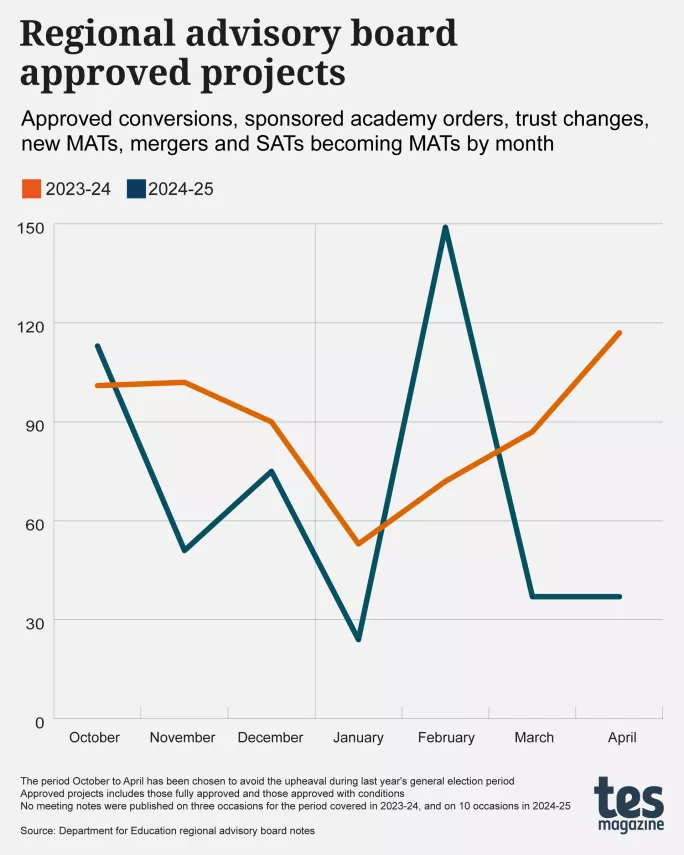
Are regional advisory boards being wound down?

There is concern over the future of the Department for Education’s regional advisory boards as their three-year terms come to an end with no re-elections planned.
Formerly known as headteacher boards, the nine regional advisory boards challenge and advise regional directors (RDs) on decisions around academisation and multi-academy trust growth.
Tes understands that elections are due but have not yet been planned, fuelling speculation that the boards will be scrapped due to the emergence of the Regional Improvement for Standards and Excellence (RISE) teams.
At the same time, a Tes analysis suggests that the boards’ activity is declining, with fewer projects being approved as the pace of academisation slows and the RISE teams are established.
Trust sector body the Confederation of School Trusts said it wants clarity on the future of the boards, which it says are a “a long-established part of the decision-making process”.
Do regional advisory boards have a future?
The regional advisory boards each have eight members, four of whom are elected by local academy headteachers. Two are appointed by regional directors and a further two are appointed on the agreement of DfE ministers.
The boards’ terms of reference, set out in 2022, state that the elected members’ election cycles are three years. Elections were held in the autumn term of 2021, with board members then starting their terms in September 2022 after regions were redrawn.
Tes understands that no new elections have been held since then, and elected members have not been told when they will take place, despite their three-year terms being set to come to an end in September this year.
Who will advise on structures?
One member of a regional advisory board told Tes: “We’ve heard nothing about elections. My guess is we will be told at a forthcoming meeting either, ‘Thank you for your time. There aren’t going to be any more advisory boards now we have RISE teams,’ or they will say they are keeping us for another interim year with a view to them deciding what the future of the boards is then.
“But at the moment it feels like there’s been no explicit conversation about whether the boards are continuing, whether RISE teams are the replacement. There will be schools that still choose to academise, though, and I’ve not seen anything to suggest RISE teams will give any advice around structures.”
No advisory board meeting took place in the West Midlands in March or April, despite meetings being originally scheduled for both months with agendas.
The London advisory board did not meet between February and May, and has yet to publish any decision notes beyond February.
Leora Cruddas, chief executive of the Confederation of School Trusts, said: “The current terms of office for elected advisory board members are due to expire by September, and there doesn’t appear time now to have new elections before the end of term.
“Advisory boards are a long-established part of the decision-making process, and we would welcome clarity for schools and trusts on how that process will work from September.”
Meanwhile, Tes analysis of regional advisory board decision notes shows there was around a 20 per cent fall in approvals for academy conversions, sponsored academy orders, trust changes, new MATs, mergers and single-academy trusts becoming MATs comparing 2023-24 and 2024-25.

Tes analysed how many of these project types were approved or approved with conditions between October and April for each year, avoiding the months when board meetings were affected by last year’s general election.
The South East board has yet to publish the minutes from its April 2025 meeting, so these decisions have not been included in the data.
Regional directors making decisions alone
The total number of the specified projects approved from October 2023 to April 2024 was 622, while the number approved for the same period in 2024-25 was 486.
On some occasions, decision notes were published but board meetings were cancelled, with RDs making decisions alone.
The board member quoted above, who wished to remain anonymous, said: “You can see in the agendas that business at the advisory boards and the speed of academisation has slowed down massively in the last year.”
The new RISE teams find and commission support for “stuck” schools, and are also supposed to provide universal support to all schools on four priorities around Reception year quality, attendance, inclusion and attainment.
Structural intervention for schools that need improvement - such as through academisation and trust changes - currently sits outside of the RISE remit.
The RD system replaced regional school commissioners, which were established in 2014.
The predecessors to the elected part of the regional advisory boards were headteacher boards. These were first set up in 2014, and further elections were held in 2017.
Elections to regional advisory boards were last held in 2021, with winners revealed in early 2022 after the DfE announced the redrawing of region boundaries.
Tes asked the DfE if new elections would be held for the boards and if the boards would continue. The DfE said it would confirm plans for the advisory boards in “due course”.
You can now get the UK’s most-trusted source of education news in a mobile app. Get Tes magazine on iOS and on Android
Register with Tes and you can read five free articles every month, plus you'll have access to our range of award-winning newsletters.
Keep reading for just £4.90 per month
You've reached your limit of free articles this month. Subscribe for £4.90 per month for three months and get:
- Unlimited access to all Tes magazine content
- Exclusive subscriber-only stories
- Award-winning email newsletters
You've reached your limit of free articles this month. Subscribe for £4.90 per month for three months and get:
- Unlimited access to all Tes magazine content
- Exclusive subscriber-only stories
- Award-winning email newsletters
topics in this article



